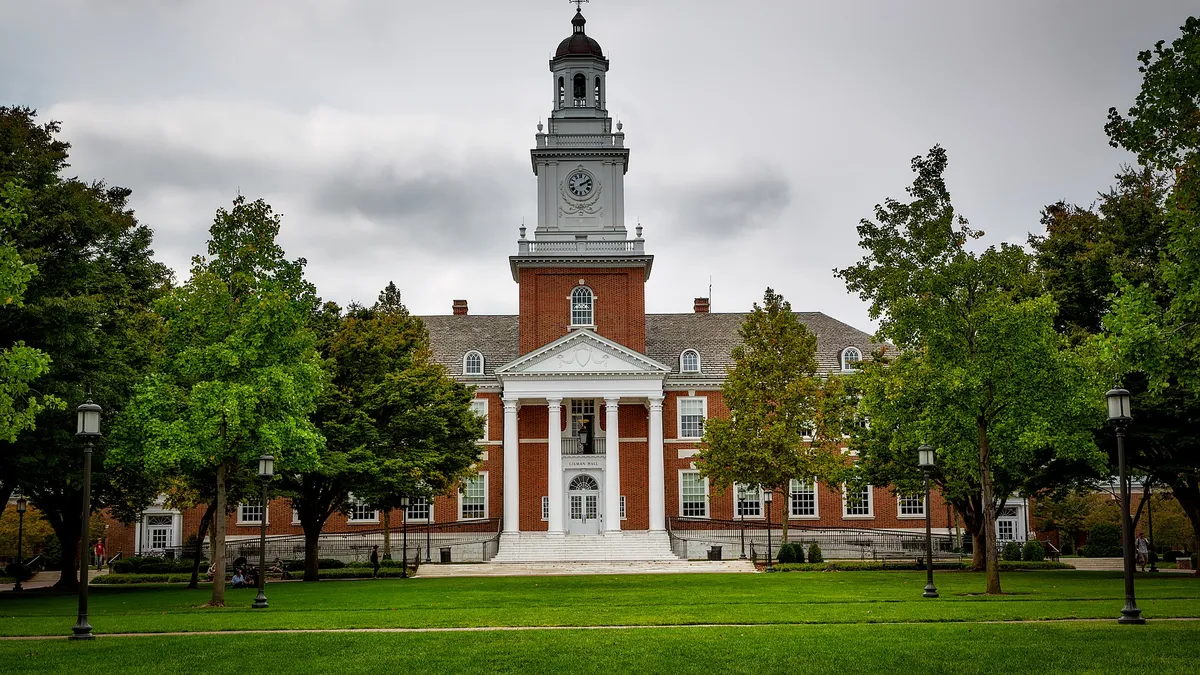Dive Brief:
- Amazon Web Services and General Dynamics are among the latest additions to a partnership between companies and colleges in the Washington, D.C., metro area that aims to fill skills gaps in fields such as data analytics and machine learning.
- The partnership, called the Capital CoLAB (Collaboration of Leaders in Academia and Business) brings together major employers such as defense contractor Northrop Grumman and energy company Exelon with about a dozen regional colleges, including Georgetown University, Johns Hopkins University, George Mason University and Howard University.
- Capital CoLAB also announced that several member colleges, including American University, Virginia Tech and Virginia Commonwealth University, either have or are planning to add a tech credential program. Students who complete the shared credential, which covers areas such as cybersecurity and data visualization, will get priority for job interviews with CoLAB member companies.
Dive Insight:
The Capital CoLAB was borne from a need to produce more tech workers in the Washington region in order to stem a growing skills gap. While there were more than 200,000 openings for digital tech jobs in 2017, colleges in the region had only awarded around 20,300 credentials, according to the group.
The area has emerged as a home to several tech companies and includes an area called "Data Center Alley" whose large concentration of data centers processes as much as 70% of global internet traffic daily. Amazon last year announced plans to build part of a second headquarters in Northern Virginia, in part to gain access to tech talent in the area.
By bringing together several large employers, colleges can determine what skills and abilities they view as most important among their workers, said American University President Sylvia Burwell at a panel Wednesday in Washington discussing the initiative.
"Then we as universities figure out what are the courses that we offer that could meet those needs and then you credential them," Burwell added.
Their objective is not to turn four-year colleges into job-training programs but rather to supplement the curriculum with digital skills students can use in the workplace, whether they're in humanities or tech fields, said Wes Bush, chairman of Northrop Grumman.
"Business has a responsibility to speak up and say what it is we actually need," Bush said. The CoLAB pinpointed three skills for the credential: data analytics, data visualization and cybersecurity.
Indeed, those fields have seen strong growth in recent years. According to a recent LinkedIn report, data scientists and analysts will soon be "among the most sought-after professionals." And shortages of those workers have already reached the tens of thousands in several tech hubs, including San Francisco and New York.
Likewise, Cybersecurity Ventures predicts a shortage of 3.5 million cybersecurity professionals worldwide by 2021.
This shifting job landscape highlights the need for colleges to adapt to faster-paced learning, panelists noted.
"The world that many of us were very comfortable with, where we go off to university and got our four-year degree and maybe stuck around and got a master's degree or something, and then said, 'OK, we've checked the square on education for our life, let's go get to work' — that world's gone," Bush said.
Instead, colleges are beginning to design programming around the concept of lifelong learning, through which people will earn credentials and skills over their lives. As such, panelists said the digital tech credential will likely need to be continuously updated to reflect the current needs of the workplace.
The CoLAB is just one of many efforts to bring industry and academia together on this issue. Amazon, Apple, Google and other major tech employers have all recently partnered with colleges to design their own curriculum in order to build a steady pipeline of workers with the skills they need.
But broader efforts are underway as well. Utah, for instance, saw its count of tech jobs grow at double the national rate from 2007 to 2017, according to data from the University of Utah's Kem C. Gardner Policy Institute.
In response, the nonprofit Silicon Slopes formed to represent the state's tech industry needs. Along with other efforts, the company has partnered with several colleges in the region to develop tech-focused programming.
Similarly, the nonprofit New York City Economic Development Corp. laid out plans last fall to grow the region's cybersecurity footprint. Among its ventures, it is partnering with the City University of New York and Facebook to launch a new master's program in cybersecurity; rolling out stackable credentials across several universities through the online education provider EdX; and offering training through boot camp specialist Fullstack Academy.











